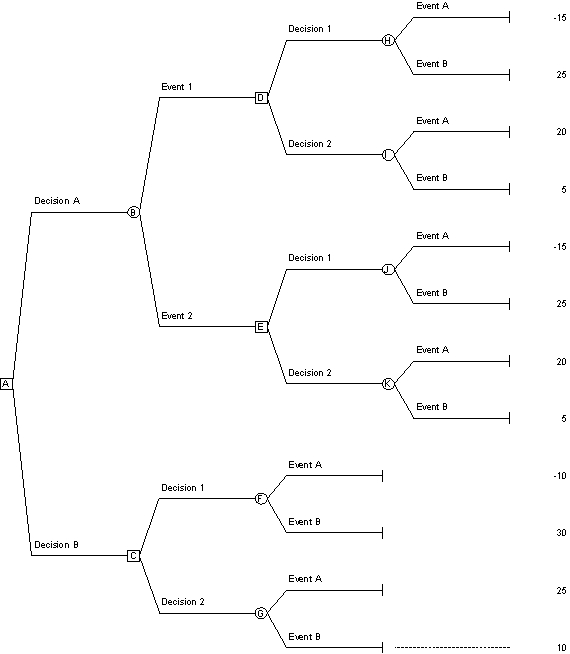Heading: Analyzing Risky Decisions
**Reference: Use the decision tree along with the given probabilities to answer the next six questions
Probability Event A = 30% Probability Event B = 70%
Probability Event 1 = 58% Probability Event 2 = 42%
Probability of Event A given that Event 1 occurs = 16%
Probability of Event B given that Event 1 occurs = 84%
Probability of Event A given that Event 2 occurs = 50%
Probability of Event B given that Event 2 occurs = 50%

-*If the decision maker chooses Decision A and Event 2 occurs, which decision alternative should the decision maker choose at node E?
Definitions:
Milgram Experiment
A psychological experiment conducted by Stanley Milgram in the 1960s to study obedience to authority, where participants were instructed to administer electric shocks to another person.
Stanford University Prison Experiment
A psychological study conducted by Philip Zimbardo in 1971 at Stanford University, where students were assigned roles of prisoners and guards to explore the effects of perceived power.
Generalization
Drawing a conclusion about a certain characteristic of a population based on a sample from it.
Logical Support
The provision of reasons or evidence to justify a claim or argument.
Q11: Sumo Pty Ltd makes submarines for coastal
Q13: Economic Value Added is defined as<br>A) the
Q17: Suppose that an industry emits a
Q22: Which statements are true?:<br>I. <span class="ql-formula"
Q24: A firm's production process uses labor, L,
Q25: Which of the following statements is incorrect?<br>A)A
Q29: Kerry Ltd owns 70% of James Ltd.For
Q42: The market for sweet potatoes consists
Q51: In the Cournot model of oligopoly,<br>A) each
Q51: Exchange efficiency, input efficiency, and substitution efficiency